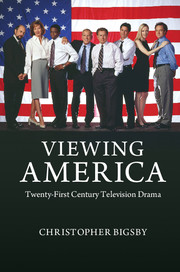Chapter One - The West Wing (NBC 1999–2006)
Published online by Cambridge University Press: 05 June 2014
Summary
There's a great tradition of storytelling that's thousands of years old, telling stories about kings and their palaces, and that's really what I wanted to do.
Aaron SorkinAaron Sorkin was born in Manhattan in 1961 where he went to the Little Red School House in Greenwich Village, which though private was once frequented by radicals and is still a favourite with those in the theatre. Arthur Miller sent his daughter there in the 1940s. It was here that Sorkin played with the daughter of an actor then appearing in Fiddler on the Roof (replacing Zero Mostel). As a result he was allowed backstage. His family, which later moved to Scarsdale, were regular theatre goers and he later recalled thumbing through the playbills his parents kept as mementoes of the shows. At Scarsdale High School he became involved in theatre.
In 1979 he went to Syracuse University where he majored in musical theatre, meaning to be an actor, and in subsequent years would appear briefly in his own teleplays, usually as a man in a bar. His many jobs included bar tending in Broadway theatres. By chance, however, and to kill time, he began writing on a friend's typewriter and discovered that his real skill lay in that direction. Unfortunately, at the same moment he discovered his writing talent he also discovered drugs, first marijuana and then cocaine, of which he said, ‘I found a drug I absolutely love and that gave me a real break from a certain nervous tension that I…carry with me moment to moment.’ He would not be the first writer for whom drugs helped unlock his talent. Nor would he be the first for whom that dependency would breed a vulnerability, not least to enforcement agencies. It would eventually end a marriage and result in an arrest.
- Type
- Chapter
- Information
- Viewing AmericaTwenty-First-Century Television Drama, pp. 23 - 64Publisher: Cambridge University PressPrint publication year: 2013



